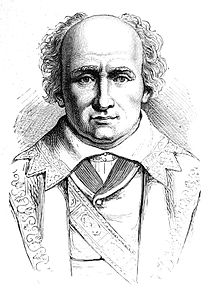This article may be confusing or unclear to readers. (March 2013) |
Louis-Jérôme Gohier (27 February 1746 – 29 May 1830) was a French politician of the Revolutionary period.
Louis-Jérôme Gohier | |
|---|---|
 Louis Gohier (Album du Centenaire) | |
| Born | 27 February 1746 Semblançay, Indre-et-Loire, France |
| Died | 29 May 1830 (aged 84) |
Medical
Revolution
Louis-Jerome Gohier was born in Indre-et-Loire, France. The son of a notary, he practiced law in Rennes. In 1789, authorities sent him to represent the town in the Estates-general. In the Legislative Assembly, he represented Ille-et-Vilaine, taking a prominent part in the deliberations. He protested against the exaction of a new oath from priests (22 November 1791), and demanded the sequestration of the émigrés' property (7 February 1792).
Gohier was Minister of Justice from March 1793 to April 1794, overseeing the arrest of Girondists, and, a member of the Council of Five Hundred, he succeeded Jean Baptiste Treilhard in the French Directory (June 1799), where he represented the Republican view in front of growing Royalist opposition.
Gohier's interaction with Boneparte
His wife was intimate with Josephine Bonaparte, and when Napoleon Bonaparte suddenly returned from the Egyptian campaign in October 1799, he repeatedly tried to win Gohier, who was then president of the Directory, to his political projects. After Bonaparte's coup of 18 Brumaire (9 November 1799), Gohier refused to resign his office, and sought an audience with Napoleon Bonaparte at the Tuileries Palace, in an attempt to save the Republic. He was escorted to the Luxembourg Palace, and on his release retired to his estate at Eaubonne.
In 1802, Napoleon Bonaparte made Gohier consul-general at Amsterdam (in the Batavian Republic), and on the union of the Kingdom of Holland with the French Empire, he was offered a similar post in the United States. Gohier's health did not permit him to take up this new appointment, and he died at Eaubonne in Paris. Although he had a family, he left his wealth, and surname to Mélanie d'Hervilly.
Works
- Mémoires d'un vétéran irreprochable de la Révolution (published in 1824)
- A report on the papers of the civil list preparatory to the trial of King Louis XVI, printed in Le Procès de Louis XVI (Paris) etc., while other reports are featured in the Moniteur Universel.
References
- This article incorporates text from a publication now in the public domain: Chisholm, Hugh, ed. (1911). Encyclopædia Britannica (11th ed.). Cambridge University Press.
{{cite encyclopedia}}: Missing or empty|title=(help)
Template:Directeurs-start Template:Directeurs 17–18 June 1799 Template:Directeurs 18–19 June 1799 Template:Directeurs 19–20 June 1799 Template:Directeurs 20 June–November 1799 Template:Directeurs-end